Hong Kong protests: The key players
- Published
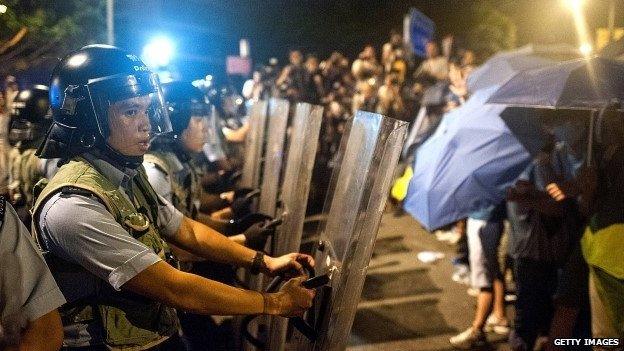
The protests concern Beijing's position on the pace of political reform in Hong Kong
Tens of thousands took to the streets in Hong Kong in late September when pro-democracy protests first erupted.
Activists set up camps at key areas in the city, but their numbers dwindled to a few hundred as the weeks dragged on, and Hong Kong residents have grown increasingly frustrated with the disruption.
Tensions flared up again in late November and early December when the authorities began demolishing protest camps.
The BBC takes a look at the main players involved in the unrest.
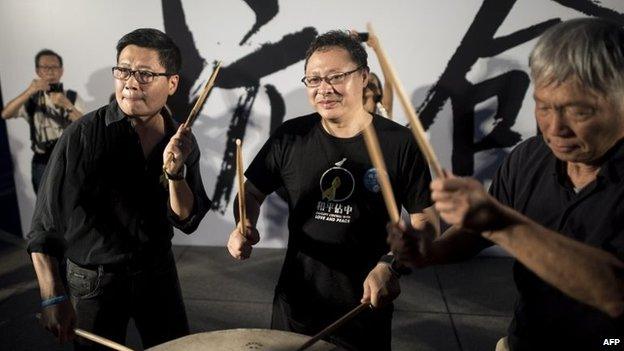
Benny Tai (centre) is one of the co-founders of Occupy Central
The pro-democracy activists
Occupy Central with Love and Peace, known as Occupy Central, external, is the civil disobedience movement formed by pro-democracy activists at the heart of the mass street protests.
Three fairly moderate figures - Benny Tai, a law professor, Chan Kin-man, a sociology professor, and Chu Yiu-ming, a church minister - are its main organisers.
Occupy Central has been urging the Chinese government not to vet candidates for Hong Kong's top leader in the next elections in 2017.
The group said it would begin a mass, non-violent campaign on 1 October, in response to Beijing's ruling in August against fully open elections in 2017, but brought its protests forward by several days following student-led demonstrations outside Hong Kong's government complex.
Occupy Central played less of a role as the protests dragged on, with student activists continuing their stand-off with authorities.
On 2 December, the three leaders announced that they would turn themselves into police the next day to take legal responsibility for participating in unauthorised public assemblies. They said surrender was a "silent denunciation of the heartless government".
They also called for protesters to retreat after violent clashes with police in previous days.
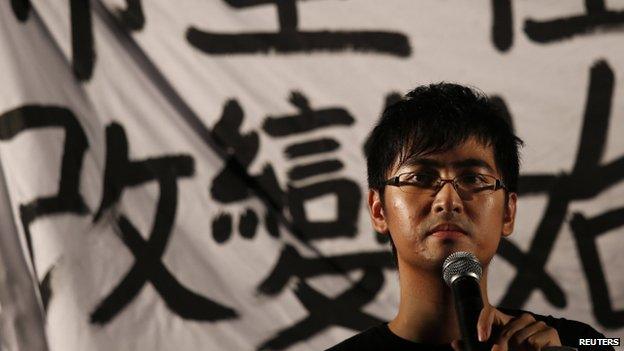
Alex Chow is the secretary-general of the Hong Kong Federation of Students
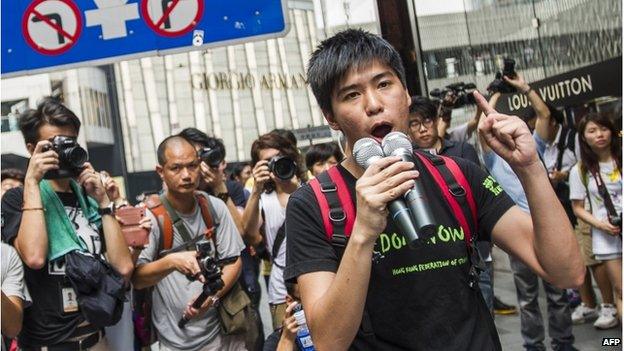
Lester Shum is the federation's deputy head
The students
Student activists have remained at the forefront of the protests, which kicked off when the Hong Kong Federation of Students, led by Alex Chow and Lester Shum, organised a week-long boycott of classes starting from 22 September.
On 26 September, student demonstrators stormed the main government compound and tensions escalated, with the police using pepper spray to evict them.
They were subsequently joined by protesters led by Occupy Central.
The students later threatened to occupy government buildings if chief executive CY Leung did not resign. Leaders entered into talks with government officials, which proved inconclusive.
In the following weeks, the students entrenched themselves at the three protest camps which they turned into tent cities complete with infrastructure such as toilets and study areas.
Student leaders attempted to travel to Beijing in November to seek an audience with Chinese Premier Li Keqiang, but were unable to leave Hong Kong when their travel visas were declared invalid.
Mr Shum was detained in late November when the authorities moved to clear the Mong Kok protest site.
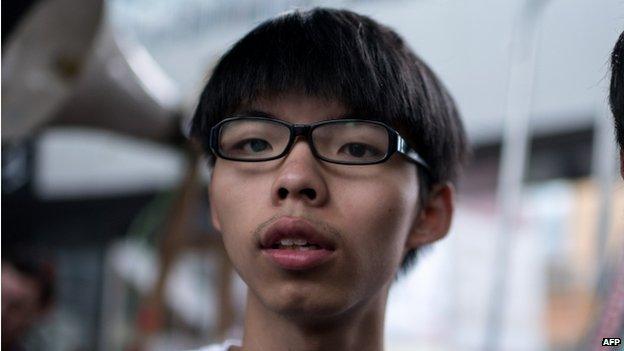
Joshua Wong has attracted intense media attention since the protests started
Joshua Wong
Joshua Wong is the 17-year-old leader of the Scholarism student movement, which campaigned two years ago against "patriotic education".
He and the two Federation of Students leaders were arrested as the student protests erupted in September.
Mr Wong was released unconditionally on the orders of a High Court judge, after more than 40 hours of detention without charge.
Claiming he had suffered bruises during his arrest, he later returned to continue rallying the crowds in their street occupation.
Mr Wong was again detained on 26 November as the authorities sought to clear the Mong Kok protest site.
On 2 December, Mr Wong began a hunger strike to try and force Beijing and Hong Kong governments to engage in talks about the 2017 election.
Profile of Joshua Wong, teenage revolutionary.
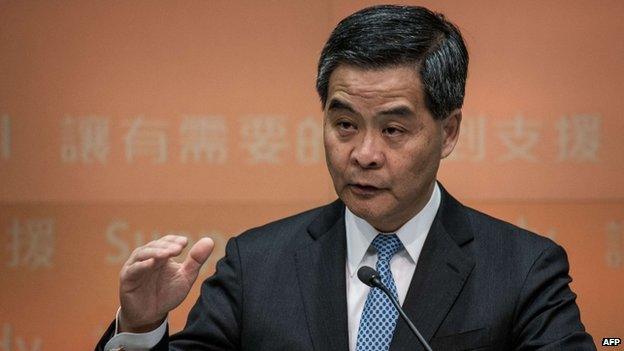
Chief Executive CY Leung is in an extremely delicate situation
Mainland and Hong Kong governments
Officials from both have spoken out against Occupy Central, external.
Beijing condemned the protests and offered its "strong backing" to the Hong Kong government.
Hong Kong Chief Executive CY Leung said the demonstration was "illegal" and elections would go ahead as planned in 2017.
But Mr Leung has very low popularity ratings and is little short of reviled among democracy activists. Some of the placards visible on the streets pour scorn on him. Activists have called for him to resign, which he has refused to do.
Supporters of Mr Leung - the territory's third chief executive since handover - say he has had to negotiate an extremely delicate situation and is committed to upholding the rule of law and all the rights enshrined in the Basic Law - Hong Kong's mini-constitution.
Beijing has praised Mr Leung's handling of the situation through editorials in the Chinese Communist Party newspaper People's Daily.
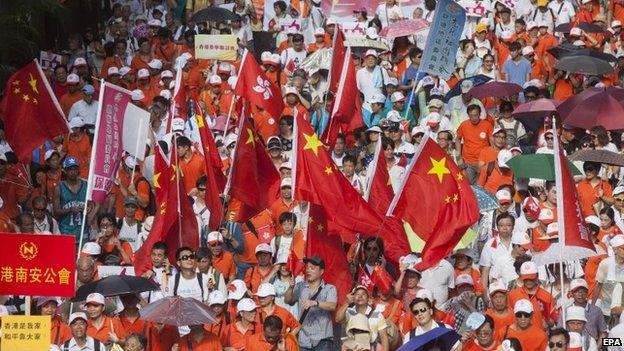
Pro-China demonstrators have rallied against the Occupy Central movement
Anti-Occupy Central groups
Pro-Beijing and pro-business parties tend to be against the campaign, and several anti-Occupy Central groups, external have been set up.
They include the Silent Majority for Hong Kong political group founded last year by members of a pro-Beijing alliance, including former RTHK radio host and economics professor, Robert Chow Yung.
The group released a video in August warning the citizens of Hong Kong of chaos and possible death if the Occupy Central protests went ahead.
At the end of the first week of the mass protests, groups of people showed up at protest sites to argue and forcibly tear down tents, most notably in Mong Kok. This prompted scuffles with pro-democracy protesters.
Police later said they had arrested several people involved in fights, and some had links to triad gangs.
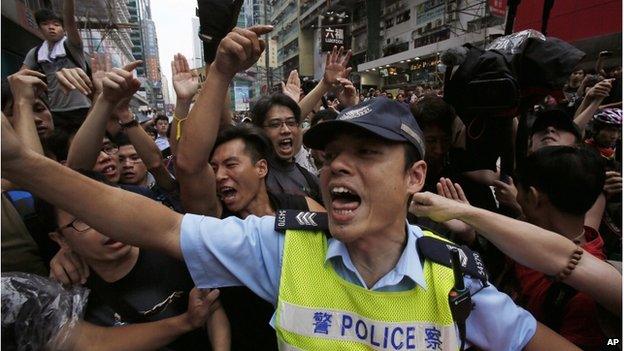
Police officers stepped in multiple times in scuffles between pro-democracy protesters and their opponents